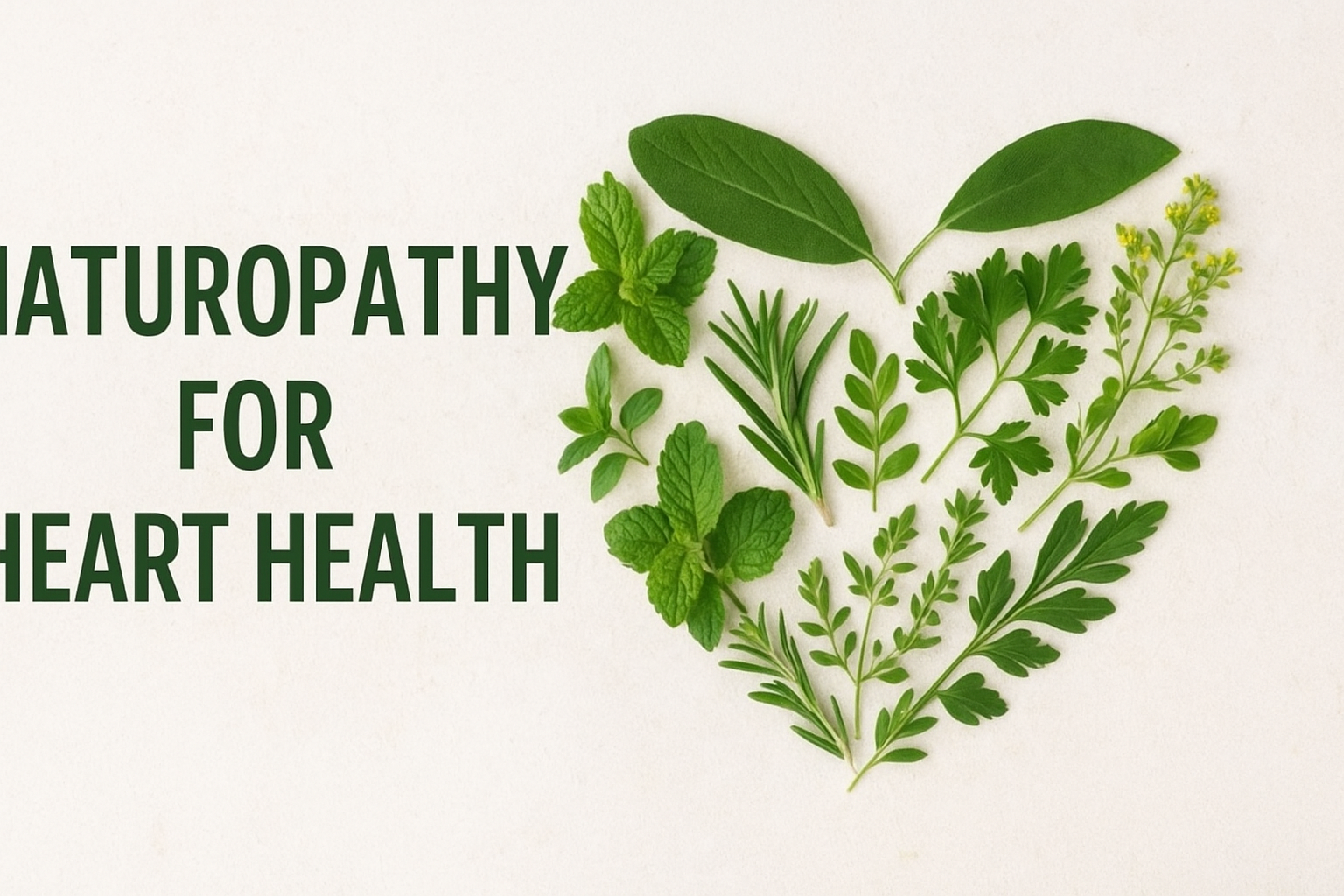Introduction: Healing the Heart the Natural Way
The heart is not just an organ — it’s the rhythm of life itself. Yet, in today’s fast-paced world filled with stress, processed foods, and sedentary habits, heart diseases have become alarmingly common.
Fortunately, naturopathy — the science of healing through nature — offers gentle, long-lasting solutions to restore cardiovascular balance and vitality.
Rooted in the body’s innate power to heal itself, naturopathy focuses on correcting the cause rather than suppressing the symptom. Using a combination of diet therapy, hydrotherapy, exercise, and stress management, it helps improve circulation, reduce inflammation, and strengthen heart muscles naturally.
In this guide, we’ll explore how to use naturopathy for heart health, including practical tips, healing foods, and proven natural remedies to keep your heart strong and balanced.
Understanding Heart Health from a Naturopathic Perspective
According to naturopathic principles, heart health depends on maintaining harmony between body, mind, and environment. When toxins, poor lifestyle, or negative emotions accumulate, they disturb circulation, blood pressure, and emotional balance — leading to heart strain.
The naturopathic approach involves:
- Eliminating toxins (Detoxification) through fasting, hydrotherapy, and fresh foods.
- Balancing nutrition with plant-based, fiber-rich, heart-supportive meals.
- Enhancing oxygen supply through breathing exercises and outdoor activity.
- Reducing emotional stress via relaxation and positive thought patterns.
The goal: Strengthen the heart’s function naturally, without overloading it with medications or chemicals — unless medically required.
How to Use Naturopathy for Heart Health (Step-by-Step Guide)
Step 1: Adopt a Heart-Healing Diet
Nutrition forms the foundation of naturopathy. The ideal heart diet is low in sodium and saturated fats but rich in antioxidants, fiber, and healthy fats.
Recommended Foods:
- Fresh fruits like pomegranate, guava, and apples
- Leafy greens: spinach, fenugreek, and drumstick leaves
- Omega-3 sources: flaxseeds, walnuts, chia seeds
- Garlic, turmeric, and ginger for natural blood cleansing
Avoid: Refined sugar, deep-fried foods, excess caffeine, and red meat.
Tip: Drink a glass of warm water with lemon each morning to flush out toxins and improve circulation.
Step 2: Practice Hydrotherapy for Circulation
Hydrotherapy — a cornerstone of naturopathy — improves blood flow, detoxification, and heart relaxation.
Simple Home Hydrotherapies:
- Cold foot bath: Lowers blood pressure and relaxes the heart.
- Hot and cold compress (alternate): Stimulates circulation and relieves congestion.
- Full wet pack: Helps in detoxifying and calming the nervous system.
Caution: People with chronic cardiac conditions should consult a naturopath before trying intensive hydrotherapy.
Step 3: Engage in Gentle Exercise and Yogic Practices
Movement keeps the heart alive. Naturopathy promotes gentle exercises that increase oxygen supply and blood flow without overexertion.
Best Practices:
- Brisk walking (30 minutes daily)
- Gentle yoga asanas like Tadasana, Vrikshasana, and Bhujangasana
- Pranayama (breathing exercises) such as Anulom Vilom and Bhramari
Note: Avoid high-intensity workouts immediately after meals or during extreme fatigue.
Step 4: Manage Stress the Natural Way
Emotional stress is one of the biggest silent killers of the heart. Naturopathy combines mind-body techniques to restore calm and reduce cortisol levels.
Try:
- Meditation and deep breathing
- Aromatherapy using lavender or sandalwood oils
- Spending time in nature (forest walks, gardening)
A calm mind supports a calm heart.
Step 5: Support with Natural Remedies and Herbs
Naturopathy also incorporates gentle herbal support to nourish the cardiovascular system.
Heart-Healthy Herbs:
- Arjuna bark (Terminalia arjuna): Strengthens heart muscles
- Hawthorn berries: Improves circulation and lowers cholesterol
- Ashwagandha: Reduces stress and blood pressure
- Tulsi: Acts as an antioxidant and supports blood purification
Dosage Tip: Always consult a certified naturopath or Ayurvedic practitioner before long-term use.
Additional Lifestyle Tips for a Healthy Heart
- Maintain regular sleep cycles — aim for 7–8 hours.
- Avoid alcohol and smoking completely.
- Practice gratitude and mindfulness daily.
- Stay hydrated — drink 2.5–3 liters of water daily.
- Get regular sun exposure for natural vitamin D.
Conclusion: Let Nature Be Your Healer
Your heart responds to care — both physical and emotional. By following the gentle principles of naturopathy, you nurture it with what nature intended: clean food, pure air, mindful movement, and emotional peace.
Learning how to use naturopathy for heart health isn’t just about avoiding disease — it’s about creating a lifestyle of natural balance, calm, and vitality.
Listen to your heartbeat — it’s nature’s rhythm within you.
FAQs Section
Can naturopathy cure heart diseases?
Naturopathy helps manage and prevent heart conditions by improving lifestyle, diet, and circulation. It complements, not replaces, medical treatment.
Which foods strengthen the heart naturally?
Pomegranates, garlic, walnuts, and leafy greens are excellent for improving heart strength and reducing bad cholesterol.
Is yoga part of naturopathy for heart health?
Yes. Gentle yoga and pranayama are integral to naturopathy, promoting oxygen flow and emotional calm.
How often should I do hydrotherapy for my heart?
Simple hydrotherapies like cold foot baths or alternating compresses can be done 2–3 times weekly, depending on health condition.
Can stress affect heart health even in young people?
Yes. Emotional stress increases blood pressure and inflammation, contributing to heart issues. Naturopathic stress management can prevent this.

